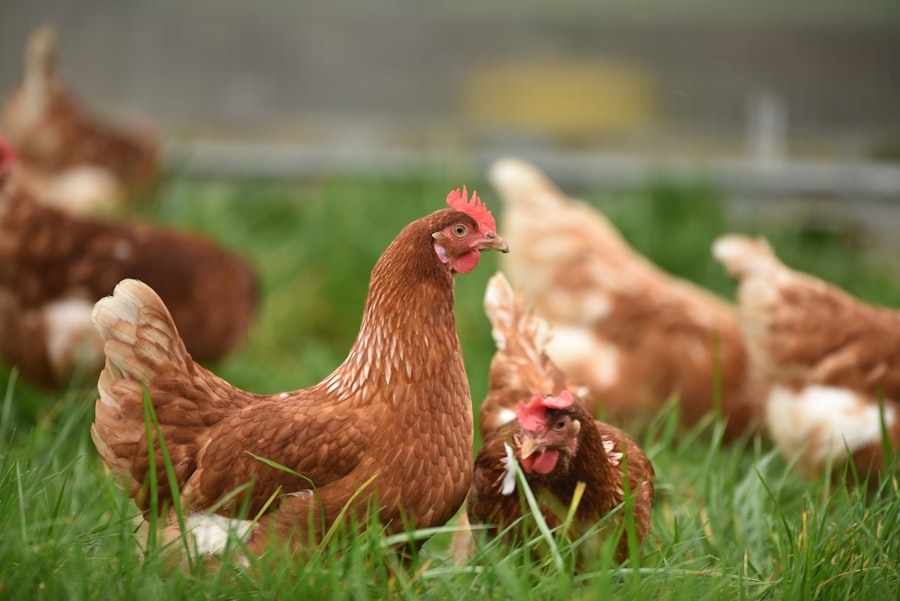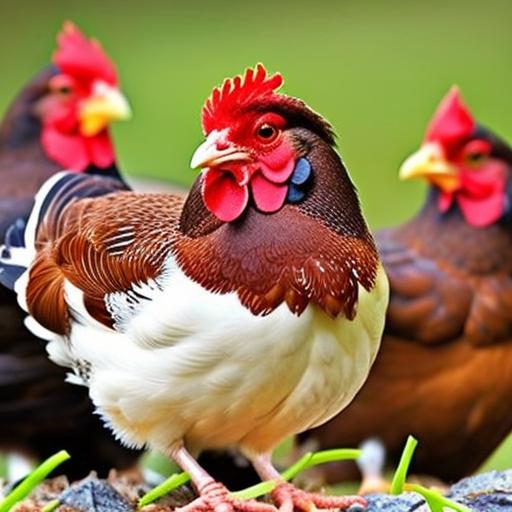Keeping backyard chickens has become increasingly popular in recent years, and for good reason. Not only do they provide a sustainable source of fresh eggs, but they also offer natural pest control and serve as a fun and educational hobby for the whole family. There are numerous benefits to raising chickens in your own backyard, making it a great idea for those who have the space and resources to do so.
One of the main advantages of keeping backyard chickens is the access to fresh eggs. Unlike store-bought eggs, which can be weeks old by the time they reach your kitchen, backyard eggs are incredibly fresh and packed with nutrients. In addition, raising your own chickens allows you to have control over their diet and living conditions, ensuring that they are healthy and producing high-quality eggs.
Another benefit of having chickens in your backyard is their ability to act as natural pest control. Chickens love to forage and eat insects, making them excellent at keeping your yard free from pests like slugs, snails, and even ticks. This not only saves you money on pest control methods but also reduces the need for harmful chemicals in your yard.
Furthermore, raising chickens can be a fun and educational hobby for the whole family. Children can learn about responsibility by helping to care for the chickens and collect eggs. They can also gain an understanding of where their food comes from and develop a connection with nature. Overall, keeping backyard chickens is a great way to enjoy the benefits of fresh eggs, natural pest control, and a rewarding hobby.
Key Takeaways
- Keeping backyard chickens is a great way to have fresh eggs and a fun hobby.
- Choosing the right chicken coop is important for the health and safety of your chickens.
- Properly positioning your chicken coop can help keep your chickens comfortable and safe.
- Feeding your chickens a balanced diet and providing clean water is essential for their health.
- Keeping your chicken coop clean, safe from predators, and well-ventilated is crucial for the well-being of your chickens.
Choosing the Right Chicken Coop for Your Backyard
When it comes to choosing a chicken coop for your backyard, there are several factors to consider. The first is the type of coop you want – stationary or mobile. Stationary coops are more traditional and provide a permanent home for your chickens. They are typically larger and offer more space for the chickens to roam. Mobile coops, on the other hand, are smaller and can be moved around your yard. They are ideal for those who want to rotate their chickens’ grazing areas or have limited space.
In addition to the type of coop, it’s important to choose one that fits the size of your backyard and the number of chickens you plan to keep. The coop should provide enough space for the chickens to move around comfortably and have separate areas for nesting and roosting. It should also have proper ventilation and insulation to keep the chickens comfortable in all weather conditions.
Properly Positioning Your Chicken Coop for Maximum Comfort
The location of your chicken coop is crucial for the comfort and well-being of your chickens. It’s important to choose a spot that is sheltered from strong winds and has access to sunlight. This will help regulate the temperature inside the coop and provide a comfortable environment for the chickens.
Additionally, the coop should be placed on a level surface with proper drainage. This will prevent water from pooling inside the coop and causing health issues for the chickens. It’s also important to consider the proximity of the coop to your house and neighbors, as chickens can be noisy at times.
Feeding Your Chickens: What to Feed and What to Avoid
Feeding your chickens a balanced diet is essential for their health and egg production. A good chicken feed should contain a mix of protein, grains, and vegetables. Protein is important for muscle development and egg production, while grains provide energy. Vegetables are a great source of vitamins and minerals.
In addition to commercial chicken feed, you can also supplement your chickens’ diet with kitchen scraps and garden waste. They will happily eat things like fruit peels, vegetable trimmings, and even weeds from your garden. However, it’s important to avoid feeding them certain foods that can be harmful, such as avocado and chocolate. These foods contain toxins that can be fatal to chickens.
Providing Clean Water for Your Chickens
Clean water is essential for the health and well-being of your chickens. They need access to fresh water at all times, especially during hot weather when they may drink more. It’s important to provide water containers that are large enough to accommodate all of your chickens and are easy to clean and refill.
Regular cleaning and refilling of water containers is crucial to prevent the growth of bacteria and algae. Chickens can become sick if they drink contaminated water, so it’s important to keep their water supply clean and fresh.
Keeping Your Chicken Coop Clean and Sanitized

Keeping your chicken coop clean is essential for preventing disease and pests. Regular cleaning and disinfecting of the coop and nesting boxes will help keep your chickens healthy and happy.
Start by removing any bedding or litter from the coop and nesting boxes. This should be done on a regular basis, depending on the number of chickens you have and the size of your coop. Replace the bedding with fresh material, such as straw or wood shavings.
Next, use a mild detergent or disinfectant to clean the surfaces of the coop, including walls, floors, and roosting bars. Pay special attention to areas where droppings may accumulate, as these can harbor bacteria and attract pests. Rinse everything thoroughly with clean water and allow it to dry before adding fresh bedding.
Keeping Your Chickens Safe from Predators
Protecting your chickens from predators is crucial for their safety and well-being. Common predators include raccoons, foxes, coyotes, and even neighborhood dogs or cats.
One of the most effective ways to keep predators out is by installing secure fencing around your chicken coop and run. The fence should be buried at least a foot underground to prevent predators from digging underneath it. It should also be tall enough to prevent predators from jumping over it.
In addition to secure fencing, it’s important to have a locking mechanism on the coop itself. This will prevent predators from gaining access to the chickens at night when they are most vulnerable. Make sure all doors and windows are securely closed and locked before leaving your chickens unattended.
Providing Proper Ventilation for Your Chicken Coop
Proper ventilation is essential for maintaining good air quality inside the chicken coop and preventing respiratory issues in chickens. Poor ventilation can lead to a buildup of ammonia from chicken droppings, which can be harmful to their respiratory system.
To ensure proper ventilation, your chicken coop should have windows or vents that can be opened and closed as needed. This will allow fresh air to circulate and remove any stale or humid air. It’s important to monitor the temperature and humidity levels inside the coop and adjust the ventilation accordingly.
Maintaining Proper Lighting in Your Chicken Coop
Proper lighting is important for both egg production and the overall health of your chickens. Chickens require a certain amount of light each day to stimulate egg production. They also need natural light to maintain their circadian rhythm and overall well-being.
Ideally, your chicken coop should have windows or skylights that allow natural light to enter during the day. If natural light is limited, you can supplement it with artificial lighting. Use a timer to ensure that the lights turn on and off at the appropriate times, mimicking the natural daylight cycle.
Enjoying the Benefits of Raising Backyard Chickens
In conclusion, keeping backyard chickens is a great idea for those who have the space and resources to do so. The benefits of fresh eggs, natural pest control, and a fun hobby for the family make it a rewarding experience.
When choosing a chicken coop, consider the type that best suits your needs and the size of your backyard. Properly positioning the coop is important for the comfort of your chickens, so choose a location that is sheltered from the wind and has access to sunlight.
Feeding your chickens a balanced diet and providing clean water are essential for their health and egg production. Regular cleaning and sanitizing of the coop will help prevent disease and pests.
Keeping your chickens safe from predators is crucial, so invest in secure fencing and locking mechanisms for the coop. Proper ventilation and lighting are also important for the well-being of your chickens.
By following these guidelines, you can enjoy the benefits of raising backyard chickens and provide them with a happy and healthy home.
If you’re interested in keeping backyard chickens, you’ll definitely want to check out this informative article on the best kind of coop for your feathered friends. Choosing the right coop is essential for their safety and well-being. Poultry Wizard provides valuable insights on different coop options, including the innovative SnapLock Chicken Coop. With its easy assembly and secure design, this coop ensures a comfortable and secure environment for your chickens. To learn more about the SnapLock Chicken Coop and other coop options, click here.
FAQs
What are backyard chickens?
Backyard chickens are domesticated chickens that are kept in a residential setting, typically for the purpose of producing eggs or meat.
Why keep backyard chickens?
Backyard chickens can provide a sustainable source of fresh eggs and meat, as well as serve as pets and provide natural pest control for gardens.
What are some tips for keeping backyard chickens?
Some tips for keeping backyard chickens include providing adequate shelter, food, and water, keeping the coop clean, providing enough space for the chickens to roam, and protecting them from predators.
What should I feed my backyard chickens?
Backyard chickens should be fed a balanced diet that includes a mix of grains, protein, and calcium. Commercial chicken feed is available, but they can also be fed fruits, vegetables, and table scraps in moderation.
How often should I clean the chicken coop?
The chicken coop should be cleaned at least once a week, or more frequently if necessary. This helps prevent the buildup of bacteria and parasites that can harm the chickens.
What are some common health issues that backyard chickens may face?
Backyard chickens may face health issues such as respiratory infections, mites and lice infestations, and egg-laying problems. It is important to monitor their health and seek veterinary care if necessary.
Do backyard chickens need to be vaccinated?
Some backyard chickens may benefit from vaccinations to prevent diseases such as Marek’s disease and Newcastle disease. Consult with a veterinarian to determine if vaccinations are necessary for your chickens.
What are some common predators that may threaten backyard chickens?
Common predators that may threaten backyard chickens include raccoons, foxes, coyotes, and birds of prey. It is important to secure the coop and run to prevent access by predators.
How many chickens should I keep in my backyard?
The number of chickens that can be kept in a backyard depends on the size of the coop and run, as well as local zoning laws. Generally, 2-4 chickens are suitable for a small backyard, while larger backyards may accommodate more.
Meet Walter, the feathered-friend fanatic of Florida! Nestled in the sunshine state, Walter struts through life with his feathered companions, clucking his way to happiness. With a coop that’s fancier than a five-star hotel, he’s the Don Juan of the chicken world. When he’s not teaching his hens to do the cha-cha, you’ll find him in a heated debate with his prized rooster, Sir Clucks-a-Lot. Walter’s poultry passion is no yolk; he’s the sunny-side-up guy you never knew you needed in your flock of friends!







